|
How Phonograph Records Are Made - Shown in Memphis
Plant
|
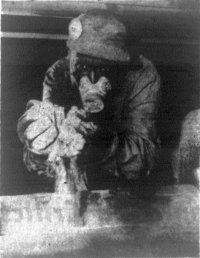
|
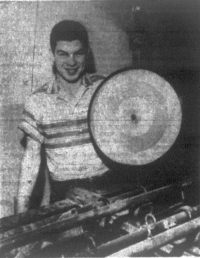
|
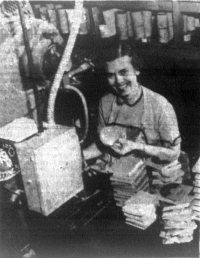
|
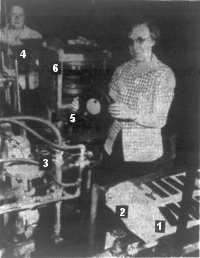
|
|
-Press-Scimitar Staff Photos by William Leaptrott
|
| RECORDS ARE MANUFACTURED, as well as recorded, in Memphis. Plastic Products Co., 1746 Chelsea, turns out more records than any other independent pressing plant in the country. first step in making a record is shown above. Sylvester Cowart drops a double handful of fine gray powder into a sheet of vinyl plastic about a quarter of an inch thick. a conveyer takes the sheet thru cutters which stamp out the "biscuits" - rectangles about 3-by-8 inches - from which the records are stamped. The only step in the recording and manufacture of phonograph records not now done is Memphis is the cutting of the acetate master from the master tape. This, too, will be done here within a month at Pepper studios and a little later at the new Sun studios. Plastic Products is owned by Robert E. (Buster) Williams of Memphis, who own also own Music Sales Co., the country's oldest independent record distributor. |
THE PLATING PROCESS, thru which the acetate master is converted into a stamper, is going on, meanwhile in another section of the Plastic Products plant. Above, Joe Rasberry puts acetate, coated with silver nitrate, into an acid solution into which are also placed copper anodes. Thru an 18-hour electroplating process, a copper surface is built up on the acetate. This metal master is peeled off, and from it, thru the very same process, is made the stamper. The stamper is then chromium plated, to make it last longer, and placed on the press. The metal master and stamper are in
reverse, like newspaper type and page casts. The acetate and "mother" are playable, just as a newspaper page mat are readable. The entire plating process - from acetate to stamper - takes two and a half days. a stamper is good for only about 2000 records, but new stampers can be made from "mothers" in just 18 hours. |
EVERY RECORD HAS A LABEL, and while the mastering process is going on elsewhere, the record labels are being made, printed and cut in the print shop at plastic products. The varicolored blank labels are printed from engravings on the firms color presses. Then type for specific recordings is set on the Linotype machine in the same shop. The type goes on the press and the titles and artists' names are printed on the labels in sheets of four. Next, the labels are cut into separate squares and stacked. The final step in manufacturing the labels is the one shown above. Here Mrs. Vergie Mae Wiley places the square labels under a cutting die and presses a button which brings pressure on the die and cuts an entire stack of labels round in one motion. Plastic Products presses records for 30 different companies all over the country, and ships to distributors everywhere west of the Rockies. Most shipments are by air for speed. Crest and Atlantic are the labels shown above. |
THE FINAL STEP in making a record is actually several steps combined. Here a press operator, Mrs. Winnie Ragland, has a supply of "biscuits" (rectangles of vinyl made from the powder in first photo) softening on steam table (1). Near them are two stacks of labels (2), one for each side of the record. Press itself looks like a waffle
iron. Operator puts a label face down on bottom stamper (3), and another face up on top stamper, puts rolled-up biscuit on top of the bottom label and top stamper handle (3)down. Steam course thru press, forming record, impressing it with grooves, and sealing labels on it. cold water follows steam thru, hardening record. Operator removes record (5) and puts it on trimmer (6). Record is ready for packaging, shipment. There are 20 presses in Memphis plant. A good operator turns out about 100 disks an hour. there are also 6 injector-type presses which take two operators but have double the capacity of other type.
|
Memphis Internationally Known as Recording Center
This is the second of three articles about one of Memphis' newest and fastest-growing industries - the recording business - by Edwin Howard, Press-Scimitar amusements editor, who got an inside view of the business while making a record himself. The Phillips International recording - "Forty-'Leven Times" b-w "More Pretty Girls Than One" went into international release this week.
By EDWIN Howard
Memphis Record Labels Listed
Here, listed alphabetically, are Memphis' 14
currently active record labels:
Albe (Lansky Brothers), Second at Beale.
Cover (Buddy Cunningham), Stratten-Warren Hardware.
Diane (John Pepper), 62 Diane.
Fernwood (Scotty Moore-Bob Buckalew), Buckalew-Pierce offices,
Columbian Mutual Tower.
Hi (Joe Coughi) 1320 S. Lauderdale.
Lee (Leon Etheridge), Wm. Lee Hotel.
Pepper (John Pepper), 62 Diane.
Phillips International (Sam C. Phillips), 706 Union.
Play Me (Bill Justis), 2065 Union Suite 105.
Stomper Time (Eddy Bond), Radio Station K-WAM.
Sun (Sam C. Phillips), 706 Union.
Summer (Jack Clement) Buckalew-Pierce offices, Columbian Mutual
Tower
Tom-Tom (John Pepper), 62 Diane.
|
Press-Scimitar Amusements Editor
On Jack Paar's Tonight show on t-v last week, Broadway Producer Leonard Sillman talked about the new edition of his periodic New Faces revues coming up next fall.
|
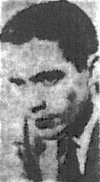
Howard |
"I'm going to audition in Memphis next week," he told Paar. "There's a lot of talent there." The statement probably surprised no one in the vast television audience except Memphians.
For, altho most Memphians are now aware that Elvis Presley is a person of some importance in the entertainment world, few realize that the city itself has, during the past five years, become one of the capitals of that world.
Cotton, hardwood flooring, plywood, mules, chemicals - these are the products traditionally mentioned in connection with Memphis. Not even the Chamber of Commerce seems to realize yet that recording and record manufacturing have given Memphis a major new
industry with a total annual gross business of close to $10 million.
Since it is a popular art as well as an industry, it also brings Memphis priceless international publicity. It makes people such as Producer
Sillman talk about Memphis on network television. It has so influenced musical styles the world over that in Europe and Japan, record labels - as on the German version of "Raunchy" by Heinz Lips and the Seven Robins - often carry a line which says, "As recorded in Memphis by Sun."
Sun the First
Sun Record Co., established six years ago by Sam C. Phillips, was Memphis' first record label. Today there are 14 active labels, and the business is growing so fast that there may be more tomorrow. (As a matter of fact, one was added today, Elston Leonard read yesterday's story and called to say he and Hillburn (Pappy) Graves are going to start releasing records next week on the Fonovox label. Leonard runs Fotovox, t-v and commercial film producing firm at 1447
Union.)
Tho the size and importance of the recording business in Memphis is not generally realized, most Memphians do know that recording is done in Memphis. Very few know, however, that Memphis has the largest independent record manufacturing plant in the country.
Plastic Products Co., 1746 Chelsea, was established by Robert E. (Buster) Williams in 1949 in one Quonset hut at a cost of about $40,000. Today it is bulging at the seams of four connected Quonsets, and
Williams is building a branch plant in coldwater, Miss., which will be twice the size of the present one.
Last year, despite the recession, the company produced 15 million records for some 30 different companies, with a retail value of more than $20 million. This year, Williams, who lives with his family at 203 Lombardy, expects to press 25 million disks of all types - singles, LPs, EPs, and stereo. The growth of the recording business in Memphis has, of course, stimulated the growth of Plastic Products, but the Memphis labels account for only about 10% of the company's volume.
Among the independent Eastern and Chicago the Memphis firm presses for are ABC-Paramount, Cadence, Carleton, Chess, Checker, Argo, and Atlantic. Besides pressing for practically all the Memphis firms, it also produces records for labels in New Orleans, Baton rouge, Mobile, Shreveport, Jackson, Miss. (home of Ace Records, which has had a couple of recent hits), Houston, Dallas and Nashville.
|

Williams |
130,000 Capacity
Capacity of the Memphis plant is 80,000 records daily, and the coldwater plant, altho unfinished, can already turn out an additional 50,000 a day. The Memphis plant employs about 100 persons.
Plastic Products' records are distributed everywhere this side of the rocky Mountains and sometimes west of them, too. About 60% of its volume leaves the Memphis trade area.
Williams, who started salting and selling peanuts at the age of 12 in his home town of Enterprise, Miss., and was the nations largest jukebox operator (18,000 machines) before going into record manufacture and distribution, also owns Music Sales Co., in Memphis. It is the oldest independent record distributing firm in the country, established in 1945. Prior to that,
the record business was dominated by the four "majors" - RCA, Columbia, Decca and Capital, which had their own distributors. There are a few other so-called "majors" now, but most of the companies established sine then are called independents.
Williams, of course, is a champion of the independent recording companies. it was they, he points out, who developed vinyl as a disk material.
"And don't let anybody tell you RCA found Elvis," he says with a note of hometown pride. "Elvis wasn't lost. Sam Phillips had already made him a big star when they bought him."
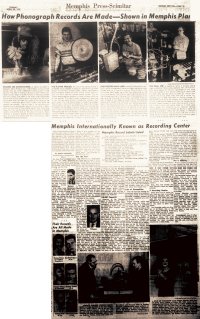 Lots of Competition Lots of Competition
Altho the Sun and Phillips International labels have produced the longest string of hits of any Memphis company, several of the newer companies are coming up fast.
Pepper Records, which also records under the Diane and Tom-tom labels, is expecting big things for two disks just released" "Little Ole Man in the Well" b-w "Ooh Yeah, Baby" by deep voiced Wayne Hefner on Tom-Tom, and "Eighth Wonder of the World" b-w "Marry Me" by Gerald Nelson on Diane. "Build a Mountain" by the Keynoters on pepper has gotten good play and the girls' quartet is booked for an appearance on the Ed Sullivan show this Sunday. John Pepper, head of this company, is one of Memphis' best-known businessmen, and Floyd Huddleston, artists and repertoire director is composer of such hits as "Island Queen."
Fernwood's "Tragedy" by Thomas Wayne is Memphis' most recent million-seller, and the company has a new one out by Wayne titled "eternally" which is off to a fast start.
The Hi label is making an impressive showing with disks by three local lads - Kimball Coburn, Tommy Tucker and Joe Fuller.
One of the newest Memphis labels, Summer, has a promising disk going in "motorcycle Michael" by the Archers.
Lee, Cover, Albe, Meteor, and Stomper time might score any time, and bill Justis, who produced many of
Sun and Phillips international's best sellers besides those he made with his own band, is almost certain to click with the something on his new Play Me label.
There have been a number of other Memphis labels which for one reason or another are no longer active.
OJ Records had a national hit in "White Silver Sands," which sent Dave Gardner soaring to fame. A local wrangle over authorship of the song has tied up profits from it, however, and suspended OJ activities. OJ also launched former Memphis disk jockey wink Martindale as a recording artist. His first record was featured in a movie and Dot records later bought his contract.
King, Kay and Crystal are other Memphis labels no longer spinning.
4 Recording Studios
Altho there are 14 active labels, there are only 4 recording studios in Memphis. Still, this is a high ration when you consider such top eastern independents as ABC-Paramount and Mercury do not own studios but rent space in other companies'.
The Memphis studios are Pepper at 62 Diane, Sun at 706 Union, royal Recording Studio (the Hi Label) at 1320 S. Lauderdale, and American Studio (the Albe label) on Second at Beale. The other Memphis companies use these facilities for their recording session on a rental basis.
The newest Memphis studio is Pepper's last-word $50,000 facility. It is equipped to record three-channel tape masters and with in a month will be cutting acetate masters on a German-made Nueman lathe, the best there is. Memphis companies now send their tape masters to Chicago to have the acetate masters cut. With this equipment, Pepper Engineer Welton Jetton will be able to take the three-channel tape masters and balance and mix them into one monaural master or into two masters for stereophonic reproduction.
Sun Is Building
Work is nearing completion on new studios for Sun and Phillips international which will be even larger than Pepper's and will also include multi-channel tape equipment and Neuman acetate cutting facilities.
The recording business has, of course, been a boon to the Memphis Federation of Musicians. up to now, more guitar players have been employed than anything else. but piano players, drummers and bass players have benefitted, too. And Bill Justis' band has become nationally known thru its recordings.
Future Memphis recording promises to utilize even more and a greater variety of musicians. Jamison Brant's arrangements for jack Hales' band, which provides most of the background for the Pepper, Diane and Tom-tom labels, liberally utilize Nick Vergos' oboe and Jim Terry's flute.
And that's a long way from Elvis, friends.
------
TOMORROW: Sam C. Phillips, and the beginnings of recording in
Memphis, of rock and roll, and a personal fortune.
|
Their Records
Are All Made
In Memphis |
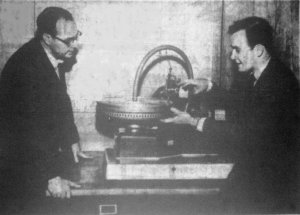
Photo by Lou Lewry |

Press-Scimitar Staff Photo by Ken Ross |
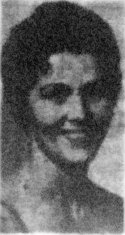 |
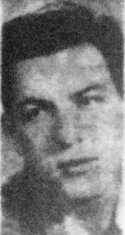 |
|
Norma Brock
of Pepper's
Keynoters |
Kimball Coburn
of Hi |
 |
 |
|
Thomas Wayne
of Fernwood |
Tommy Tucker
of Hi |
 |
 |
|
Johnny Cash
of Sun |
Jerry Lee Lewis
of Sun |
ACETATE MASTER CUTTING EQUIPMENT is being installed in the new Pepper Records studio (above) and in the new Sun Records studios. Acetate cutting has been the only step in recording and record manufacturing not done in Memphis. Above, Pepper engineer Welton Jetton (left) looks over the firm's new Neuman lathe as Stephen Temmer, internationally known authority on sound recording and American representative of the George Neumann Laboratories in Germany, explains fine points of the cutter's operation.
|
A STAR OF TOMORROW on the Pepper Records label may be pretty Nancy Adams of Fulton, Ky. 1956 winner of the mid-south Fair Talent Show, and an Arthur Godfrey Talent scouts winner who was held over for nine weeks on the Godfrey daytime show. Nancy is shown in her first recording session in the new Pepper studio at 62 Diane. Obviously happy with her singing, behind the double glass window of the control room, are Floyd Huddleston (standing) director of artists and repertoire, and Welton Jetton, chief engineer
|
Article by Edwin Howard - April 28, 1959
Memphis Press-Scimitar courtesy Memphis Public Library
article added September 12, 2013
The above article is reprinted exactly as it appeared in the
April 28th 1959 edition of the Memphis Commercial Appeal for posterity.
See also
See also the 1st and 3rd
of this series the studio pages on Sun and Sam Phillips
Recording Service.
Plastic Products Co.

The former Plastic Products Co. Quonset Huts on Chelsea
Ave. in Memphis, TN - Aug. 2, 2013
Photo © James V. Roy
Though RCA Victor launched the first commercially-available vinyl
long-playing record in 1930 it didn't really become viable or popular
until after WWII when commercial rivalry between RCA Victor and Columbia
Records and their 45 rpm (EP) vs. the 33⅓ LP formats all but replaced
the 78. From 1948 to 1950 record companies and consumers faced
uncertainty over which of these formats would prevail but eventually the
12" 33⅓ rpm LP prevailed as the predominant format for musical albums
while the 7" 45 rpm EP or "single" established a significant niche for
shorter duration discs typically containing one song on each side.1

The former Plastic Products Co. Quonset Hut at 1746
Chelsea Ave. in Memphis, TN - Aug. 2, 2013
Photo © James V. Roy
Plastic Products was born as the market for vinyl – rock ‘n’ roll and
rhythm and blues records in particular – grew to become the bedrock of a
new youth culture. “It was kind of a natural progression for him. He was
in the business from the standpoint of jukebox and coin machines,” said
his son, Robert Williams, who worked in the business too including as a
plant manager. “The next step was the wholesale distribution of records.
He was using so many records himself, he thought why not start a
wholesale business and save himself some money. The next progression
from that was actually making the records.” And it all had the gift of
timing.2
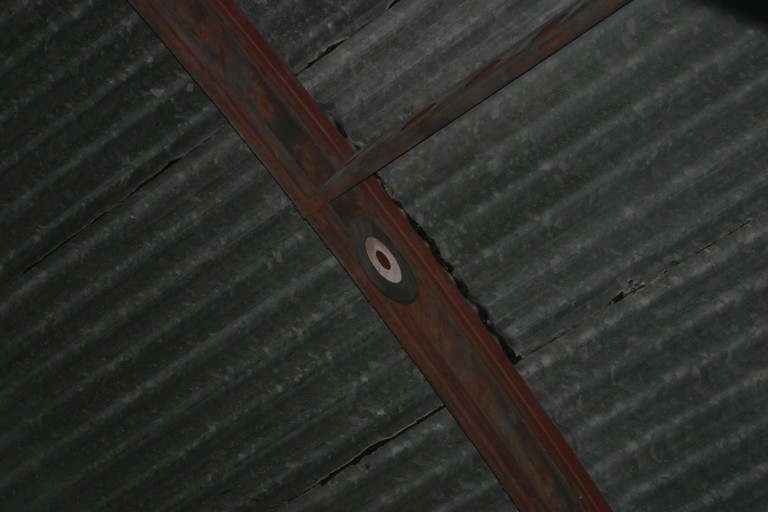
A record on the hut's bracing in the former Plastic
Products Co. at 1746 Chelsea Ave. in Memphis, TN - Aug. 2, 2013
Photo © James V. Roy
Robert "Buster" Williams, opened Plastic Products at 1749 Chelsea Ave in
1949 and in so doing became the second independent record pressing plant
in the nation. They pressed records for most of the Memphis area's
independent labels including Sun and in July of 1954 Elvis was there to
watch the first records of Sun #209 "That's All Right/Blue Moon of
Kentucky" come off the press. With the advent of the 45-rpm record, and
the onset of rock-and-roll, Fortune Magazine pegged Plastic Products
sales at six million records annually, with a profit of 2 to 3 cents
each. Business was so good Billboard Magazine reported in 1956 that
Williams purchased a company plane.3
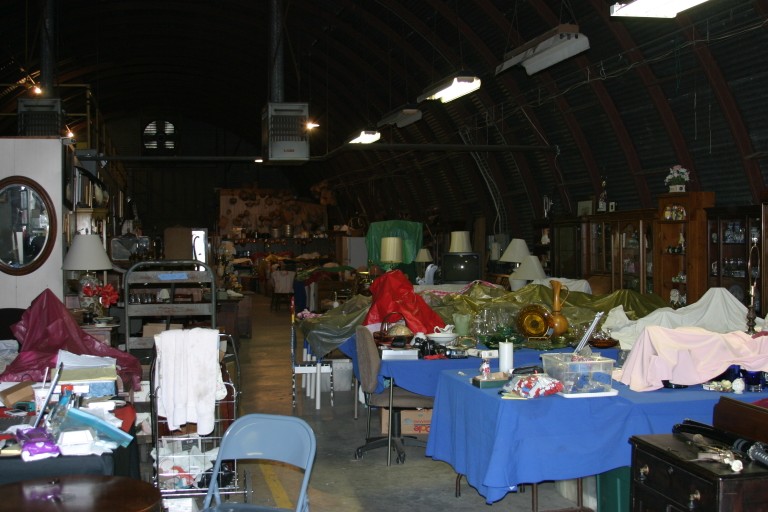
The interior of former Plastic Products Co. at 1746
Chelsea Ave. in Memphis, TN now occupied by Estate Sales Service - Aug.
2, 2013
Photo © James V. Roy
“This thing grew very rapidly and I think was a surprise to Dad
really,” the younger Williams said of his father, who died in 1992. “He
didn’t expect it to grow to the size that it became.” With another
larger plant in Coldwater, Miss., Plastic Products could turn out
150,000 singles a day, not counting albums. By the 1970s, the company
had a third plant in Philadelphia.2
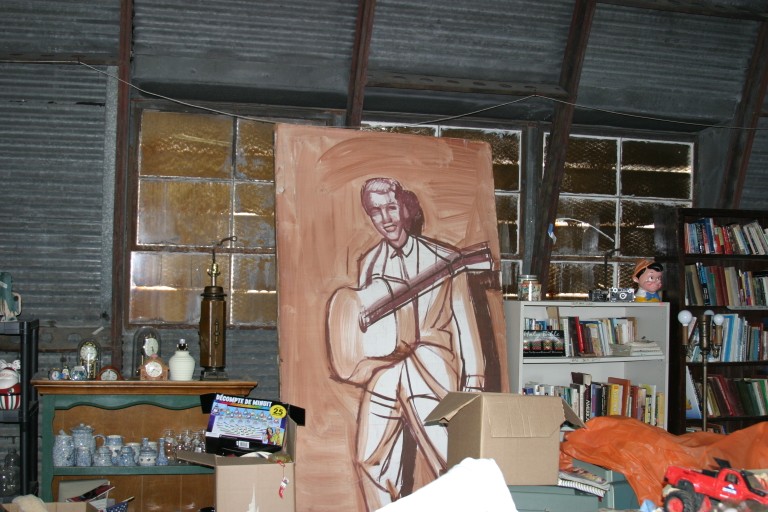
The interior of former Plastic Products Co. at 1746
Chelsea Ave. in Memphis, TN now occupied by Estate Sales Service - Aug.
2, 2013
Photo © James V. Roy
On August 17th, 2012, at the end of Elvis Week in Memphis they held a
dedication for the placement of a historical marker at the former site
of Plastic Products. It was free to attend and among the almost 100 that
did. in addition to Buster's children and many fans, was J.M. Van
Eaton who played on those Sun Record sides as the drummer in Jerry Lee
Lewis’ band and others. Van Eaton talked of the excitement of seeing his
first single with Lewis “Crazy Arms” being pressed.2
|

Sue Zan Williams,
Lynn Williams and
Richard Williams,
children of Plastic Products founder Buster Williams,
unveiling the historical marker outside the North Memphis site along with
Memphis Convention and Visitors Bureau president Kevin Kane.
- Aug. 17, 2012
Photo © Bill Dries |
“When we found out you could actually come over here and get your
records off the press, it was a cool thing,” he said. Van Eaton
remembered several record presses working at the same time, making the
45s and putting what became the historic gold Sun label on each and
every one of them. “It was a wonderful thing to come over here and get
your hands on a first copy,” he said. “You’d get them to the distributor
and let them get them to the radio station. I can’t even put into words
how you feel when you hear something that you’ve created played on the
radio. I’m 17 or 18 years old when all of this was first starting. It
was something to behold.”2
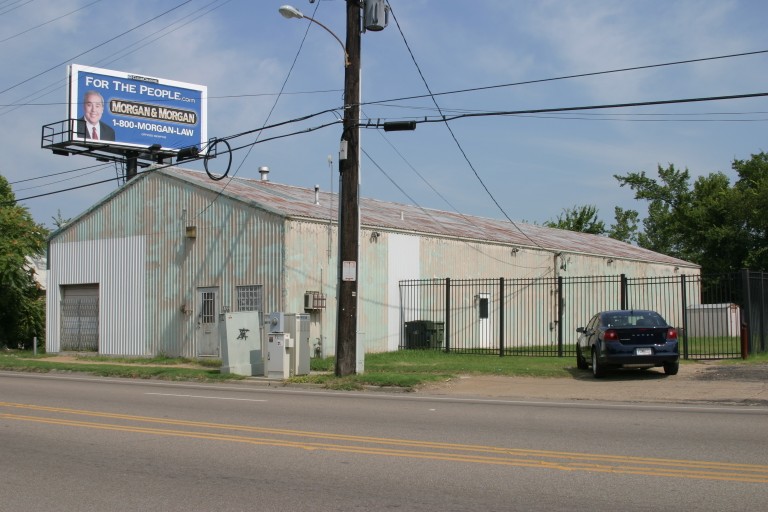
The remaining structure owned by Robert Williams of
Plastic Products Co.'s son Robert on Chelsea Ave. in Memphis, TN - Aug. 2, 2013
Photo © James V. Roy
By the 1980s digital media was introduced and by the '90s the compact
disc had all but replaced vinyl, though vinyl records continue to be
manufactured and sold in the 21st century.1
Buster's son Robert sold two of the Quonsets huts, including the first
at 1746 Chelsea, around 1993 to June Critchfield who operates her Estate
Sales Service out of there. Several years after, he sold the remaining
two but has retained the rectangular building situated along the row of
huts on Chelsea Ave. and runs his own business from there. All of the
vinyl producing equipment has long since been removed.

The row of Quonset huts
that housed the
Plastic Products Co.
on Chelsea Ave. in Memphis, TN
- Aug. 2, 2013
Photo © James V. Roy
1 according "The
Record Collectors Guild"
2 according to or excerpt from
Marking History North Memphis landmark recognized for musical
contributions By Bill Dries,
August 22, 2012 courtesy
Memphis Daily
News
3
according to or excerpt from
Plastic Powered Pop Propels Memphis Music Multiplication By Rob
Grayson, October 18, 2011 courtesy
WKNO
|







 Lots of Competition
Lots of Competition















